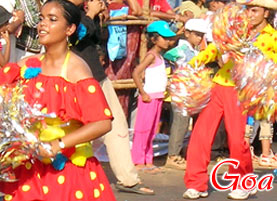Carnival
means a complete holiday dedicated to fun and enjoying as a break from
the daily routine and stress of the every-day life. The word 'carnival'
is originated from a Latin word 'carnelevarium' meaning 'removing the
flesh' or 'raising a gala storm'. The first country to play host to the
carnival was Brazil, from where the tradition spread out to all the
countries world over as a festival of revelry and fun. However, all the
countries celebrate carnivals in different forms. Brazilian carnival is
5 days long held before Ash Wednesday, the beginning of the fasting
month of Lent dedicated to penance and abstinence.
The unique concept of Carnival in Rio de Janeiro was total freedom to
everybody including men, women, boys and girls who could do whatever
they like and go wherever they want during this period without any
remorse or scrutiny, cutting out the need for making enquiries or
telling lies. Carnivals became a craze in the entire Christian world and
there are colorful celebrations in Rome, Munich, Paris, Cologne,
Buenos-Aires, Montevideo, Venice and Nice. According to the legend, the
Royal house in ancient Rome used to observe the 17th of February in
honor of Fanno-the God shepherds and their flock.
Animal sacrifices and offering of the sacrificial meat to the wolves
that attacked the flock characterized these feasts. Some people also
believe Rome was founded by Romulo and Remo who were stranded alone in
the forest as infants and a She-Wolf brought them up showing much more
compassion than human beings often do to their own kind and hence the
offering of meat to the wolves. At that time, the carnival was observed
as a religious occasion and many practices and liberties were banned by
the Church such as the unfair advantage that participants took by
wearing masks during these celebrations.




